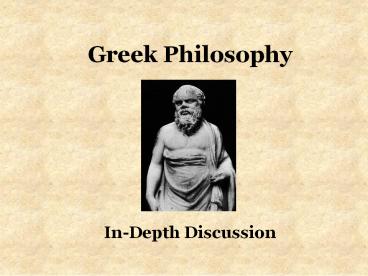Greek Philosophy - PowerPoint PPT Presentation
1 / 14
Title:
Greek Philosophy
Description:
Greek Philosophy In-Depth Discussion Concepts of Greek Philosophy The heart of Socrates' teaching: The unexamined life is not worth living. Socratic Method ... – PowerPoint PPT presentation
Number of Views:169
Avg rating:3.0/5.0
Title: Greek Philosophy
1
Greek Philosophy
- In-Depth Discussion
2
Concepts of Greek Philosophy
- The heart of Socrates' teaching
- The unexamined life is not worth living.
- Socratic Method
- Posed questions and then questioned the answers
- Searched for the ultimate nature of qualities
- What is Duty?
- What is Truth?
- What is Evil?
- What is Ethical?
3
Socrates470-399 BC
- Divided philosophy into 2 groups
- Pre-Socratics
- After were based upon his ethics and methods
- Philosophers versus Sophists
- Believed in a single, all powerful God
- Used dialectics (Socratic Method) to find
ultimate truth
4
Socrates
- Convicted of corrupting the youth
- Described as the best and wisest and most
noble man
5
Socrates
- Taught a barbarian the Pythagorean Theorem
- Knowledge is intuitive and is merely revealed by
learning
Conclusion Everyone can learn everything
6
Plato 427-347 BC
- Student of Socrates
- Born an aristocrat
- Founded the Academy
- First university
- Purpose of the university (and of life)
- Thinking about deeper meanings
- Wrote dialogues of Socrates, his own political
theory and works of ethics
7
Plato
- The heart of Plato's (student of Socrates)
teachings - What is the real nature of things?
- What is this?
- Is the right angle perfectly 90º?
Conclusion Only the Form of the angle is
perfect.
8
Concepts of Greek Philosophy
- Rhetoric
- Ethos power of persuasion created by the
character of the speaker (Gettysburg Address) - Pathos power of persuasion created by the
passion of the speaker (I Have a Dream speech) - Logos power of logic (syllogisms)
9
Plato and Civilization
- Concepts adopted by Christian thinkers,
especially St. Augustine - God is the Form
- God cannot be physical
- God is perfect (and therefore unchanging)
10
Aristotle384-322 BC
- Son of a physician
- Born in Macedonia
- Attended the Academy
- Became Platos foremost student
- Left the Academy when Plato died
- Founded the Lyceum in Athens
- More focused in natural science
11
Aristotle
- Wrote on physics
- Universe is eternal, finite and spherical
- Earth is center of the universe
- World composed of 4 elements (earth, fire, water,
air) - Heavens composed of aether (quintessence)
- 4 elements affected by qualities (dry, cold, wet,
hot) - Real objects are composites of Form and matter
12
Aristotle
- Developed rules of logic
- Syllogism
- All trees need light.
- An oak is tree.
- Therefore, oaks need light.
- Inductive
- This dog needs lungs, therefore all dogs need
lungs - Deductive
- All dogs have lungs, therefore this dog has lungs
- Aristotle favored deductive reasoning
13
Aristotle
- Wrote about Rhetoric
- Ethospower of persuasion created by the
character - Pathospower of persuasion created by passion
- Logospower of persuasion contained in the speech
itself
14
Aristotle
- Wrote about Art including writing as a form of
art - Plays were literally play acting of the real
form of man and gods.





![[PDF] READ Free The Greek Way PowerPoint PPT Presentation](https://s3.amazonaws.com/images.powershow.com/10117953.th0.jpg?_=20240902072)

























